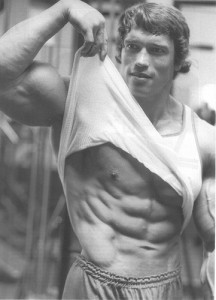 Ever wondered what happens to your major anabolic hormones when you diet down to low levels of body fat? Apparently some researchers from Israel did, hence the subject of this article. Anyone that has ever dieted down for prolonged periods of time knows that retaining muscle becomes as much of a challenge as getting down to even lower levels of body fat.
Ever wondered what happens to your major anabolic hormones when you diet down to low levels of body fat? Apparently some researchers from Israel did, hence the subject of this article. Anyone that has ever dieted down for prolonged periods of time knows that retaining muscle becomes as much of a challenge as getting down to even lower levels of body fat.
Not everyone diets down to contest-ready conditioning of course, but the effects of low caloric intakes over time are universal. Generally speaking, we’re well aware of the negatives stemming from this – lack of energy, lethargy, diminished sex drive, major hunger pangs, large appetite etc. Science has advanced a proverbial shit-ton in the past ten years and identified a chief suspect as the cause of all this: Leptin. This so-called mother hormone is released by muscle and organs, but mostly by fat stores for long-term regulation, and via energy flux (i.e. calories in vs. calories burnt) for short-term regulation. It governs pretty much everything. And when I say everything, I mean pretty much everything – it controls thyroid, sex hormones, appetite hormones, insulin and more. As calories are restricted and body fat is metabolized for energy leptin will go down, which explains why diets stagnate after a couple of weeks.
The researchers didn’t look at leptin in this study, but I wanted to prove some very brief info on it to begin with as I plan to reference it in relation to the three anabolic pathways they did look at – insulin, IGF-1 and testosterone. Testosterone is a steroid chiefly responsible for the secondary male characteristics, including building muscle mass. It does this by activating androgen receptors on the cell, informing the nucleus to increase the rate of protein synthesis leading to larger muscles. IGF-1 is a peptide hormone very similar to insulin, involved in cell proliferation and growth, closely tied to growth hormone. Lastly, insulin is another peptide hormone that is probably the most anabolic hormone in the body. I could talk all day about this hormone, but all I will leave it at for now is that it is a storage hormone, helping calories (nutrients) enter cells. I plan to write more in-depth articles about these and other hormones and their use to bodybuilders in the not-too-distant-future, but this will do for now.
Because leptin regulates all, you’d expect a decline in leptin due to a prolonged caloric deficit and loss of body fat to result in a drop in the level of these hormones. And guess what? They do. The researchers got a group of 14 bodybuilders, asking seven of them to diet down and the other seven to keep doing what they do (i.e. a control group, and I know which one I’d rather be in). The dieting group followed a diet for eleven weeks, during which time they checked in with a hormone panel after six weeks and then three days out. Of these readings, they noted that testosterone declined, but only for the first six weeks and didn’t really dip a huge amount. This may surprise the people who firmly believe that their testosterone levels must be near to non-existent during dieting due to their lack of libido. IGF-1 is correlated with insulin, and changes in the hormone were tied to changes in insulin levels. This is also likely tied to the relationship between leptin and insulin, which researchers are looking more closely at recently as it has generally been determined the two are intimately linked. Incidentally, the lower levels of body fat resulted in lower levels of insulin, or to put it another way, insulin sensitivity increased (so less is required to do the same job). It would be nice if this was just in muscle cells, but unfortunately it also makes fat cells more sensitive to the storage effects of insulin. This is one of the reasons why fat re-gain is so easy after completion of a diet.
Hopefully this sheds some light on exactly why muscle is difficult to maintain during dieting beyond what manifests on the outside.
Source: Mäestu J, Eliakim A, Jürimäe J, Valter I, Jürimäe T. Anabolic and Catabolic Hormones and Energy Balance of the Male Bodybuilders During the Preparation for the Competition. J Strength Cond Res. 2010 Mar 17.
